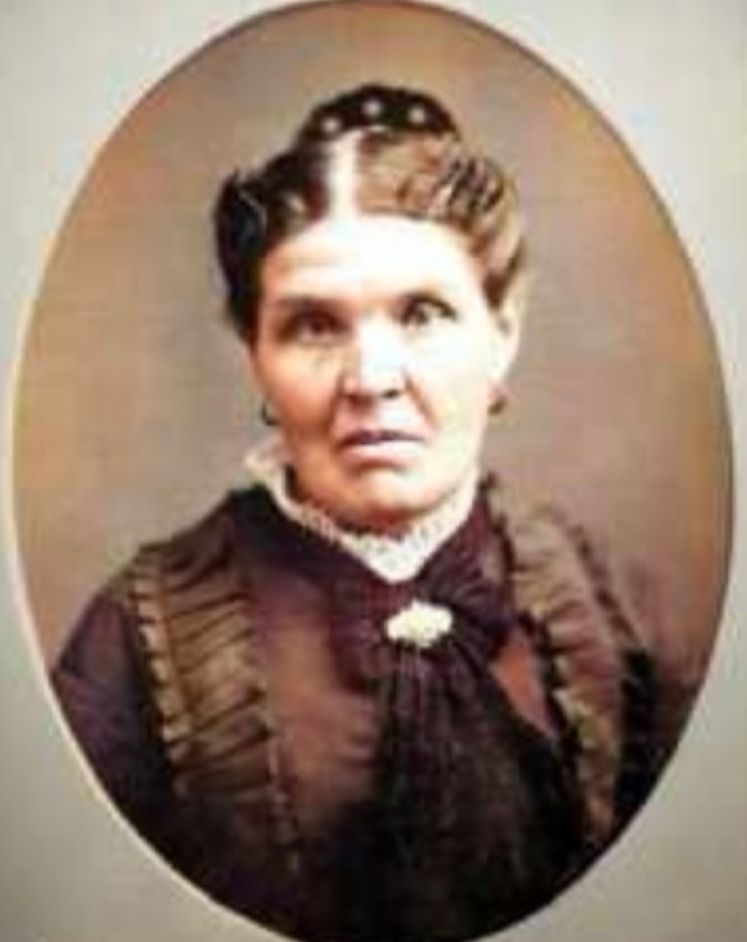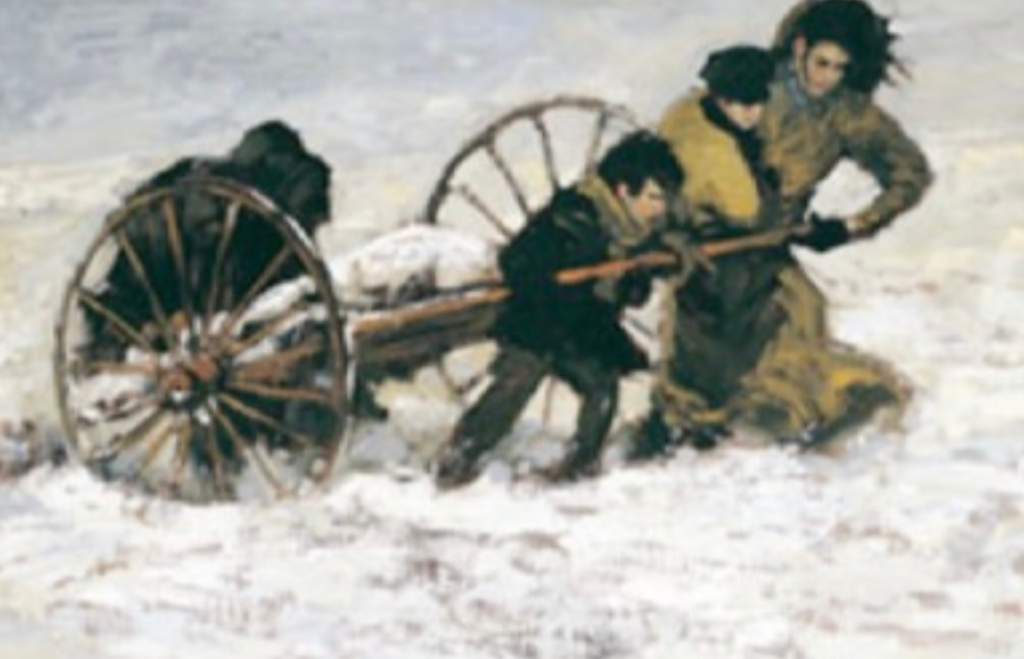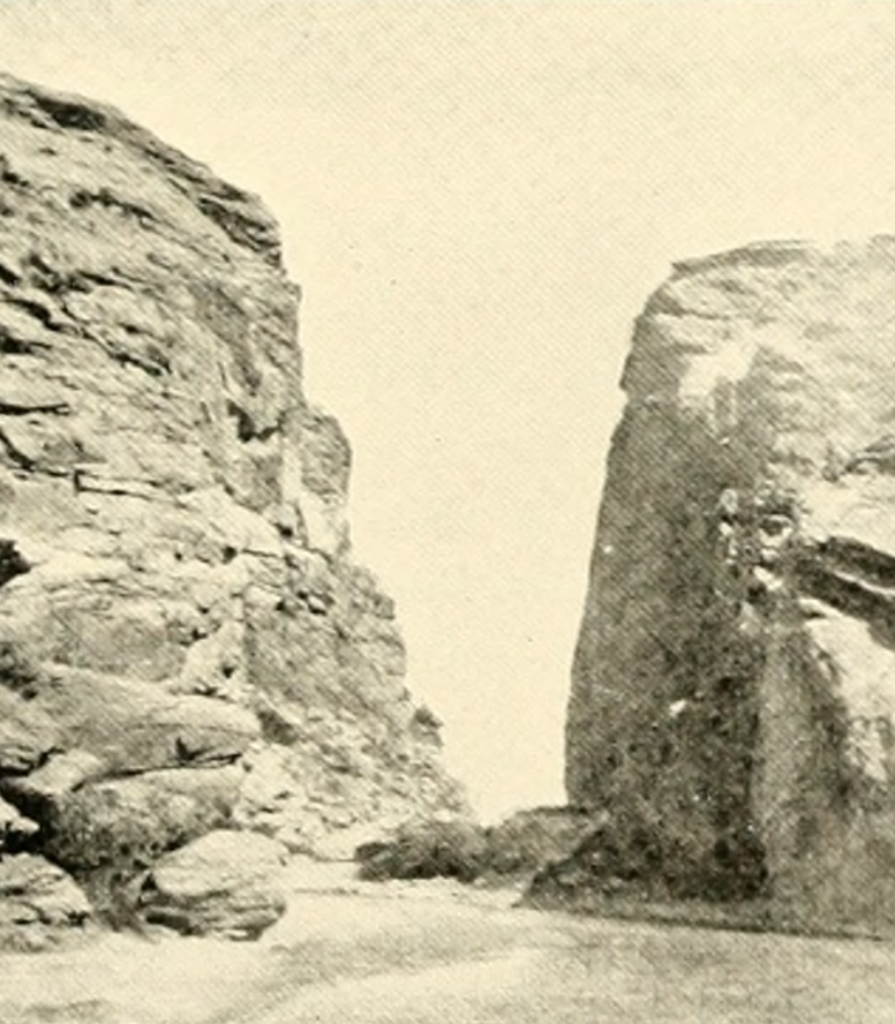By Andrea Bell

Growing up in Utah, the tales of pioneers were woven into the fabric of my childhood. Little did I realize that the gripping narratives of these pioneers were not just stories but the lived experiences of my own family. Moved by the heartbreaking story of the woman who buried her son and husband in shallow graves along the frozen trail, later revealed to be my great-grandmother. Who once lived in the home where I spent my childhood, the home that my parents now own. This is the incredible story of Alice Walsh Strong, a woman I am proud and blessed to call my own, whose resilience, positivity, and unwavering faith defy the odds.
In the heart of England’s Industrial Revolution, a young mill girl named Alice toiled in the cotton mills of Lancashire. Her life took a profound turn when she heard the teachings of missionaries from America, sparking a newfound hope and faith in her heart. Against all odds, she embraced this new religion, The Church of Jesus Christ of Latter Day Saints, ultimately leading her on a remarkable journey of faith, sacrifice, and endurance.
As Alice married William Walsh and started a family, the call to gather to Zion resonated within her.
Together with their three young children, they embarked on a perilous journey with the Martin Handcart Company of 1856, crossing the stormy Atlantic to fulfill their divine calling. Little did they know that this journey would test their faith and resilience to the limits.

Embarking on the westward journey with a handcart was a test of endurance and fortitude for pioneers. Opting for a more economical yet arduous route, they navigated the unforgiving terrain with two-wheeled carts laden with their possessions. The rhythmic trundle of wheels and determined footsteps
echoed the challenges faced by those pulling the carts themselves. The physical toll was palpable as they persevered through harsh conditions. In the vein of the Walsh family’s resilience, these handcart pioneers etched a poignant chapter in the larger narrative of westward expansion, leaving an enduring legacy of courage and determination on the untamed canvas of the American frontier. Alice Walsh Strong’s story stands as a testament to the indomitable spirit of those who braved the unknown, exemplifying that faith and endurance can triumph over even the harshest of trials.
In the unforgiving embrace of a Wyoming winter, Alice Walsh Strong found herself huddled with her two children under a snow-covered handcart at Devil’s Gate. With her husband, William, standing guard against the perils of the night, and the biting cold intensifying, Alice reflected on the hardships that led her to this dire moment. The trek


from Liverpool to Winter Quarters was arduous, plagued by storms and a measles outbreak. Tragedy struck when all three children succumbed to illness during the Atlantic crossing, the oldest Robert being stricken most severely.
Arriving in the Winter Quarters, they faced a scarcity of materials and no means to sustain themselves over the winter, forcing them to join a handcart company led by Captain Edward Martin. Unprepared, Alice and William faced the harsh reality of
prairie life as they pulled and pushed their handcart through the rugged terrain, enduring bitter cold and rationed supplies. Alice spoke of grown men driven to tears from the lack of nourishment. She reflects on the passing of her oldest son recalling being so stricken with grief was unable to recall where he was buried.
“My husband died at Devil’s Gate. The ground was frozen so hard the morning he died that they could not dig a grave. I think they must have put him under the snow. Nine others died the same night. This left me alone to care for my two children. The boy [John, age 3] became so weak that he could not stand alone. I had to sit and hold both children nearly all the time. When we came to a place where we could go no further and I had no exercise, my shoes froze to my feet. Later when I was able to remove them, the skin and flesh came off too, leaving only the bones. My hands were severely frozen.”
In the heart of Wyoming, where the Sweetwater River carved through mountains, Alice’s plight reached its height. Snowed in at Devil’s Gate, she faced the stark reality of being a widow. Now left to care for her children in brutal conditions.

Help finally arrived in the form of Joseph A. Young from the Salt Lake Valley, marking a turning point for Alice and her children. Their arrival in Salt Lake City on November 30, 1856, marked the end of a treacherous journey. Doctors did their best with her badly frozen feet so that she may still be able to walk, marking the beginning of a new life.
Life in the Salt Lake Valley presented fresh challenges, but Alice found solace living among the Saints, guided by Prophet Brigham Young. Despite the sacrifices and hardships, Alice’s resilience shone through. Her family, taken in by the Strong family, became an example of the strength and unity fostered within the community.
As Alice’s life in Utah unfolds, so does the state’s transformation—witnessing the joining of the Transcontinental Railroad, the struggle for statehood, and the changing landscape of a burgeoning community. Weathering the storms of life, including the grasshopper plague and the great famine, later forced from their homes and possessions to move south due to threats from the army. Alice related “times were hard there, and it was very difficult to find enough to eat.”
Most of the time, life was just working hard to have enough for her family to eat and keep them clothed. All her children learned at an early age how to help with the cooking, in the garden, gathering wild fruits and berries, and to find odd jobs to bring in a little money for the family. Alice was industrious and creative in providing for her family and contributing to the Relief Society organization-serving.
Alice, amidst all the hardship lived a full and enjoyable life and married and had three more children. She enjoyed life and motherhood. In her later years, Alice, known as Grandma Strong, became a revered figure in North Ogden. Her life was marked by enduring friendships, celebrations, and the passing of an era as statehood dawned. The story culminates with Alice’s passing at the age of 96, leaving behind a legacy of faith, sacrifice, and an unshakable belief in the gospel.
Alice’s testimony echoes through the generations, urging her descendants to recognize her sacrifices, hold strong to their faith, and work for the sake of the gospel. Her life, intertwined with the history of Utah, serves as an inspiration—a testament to the indomitable spirit that guided her through the Refiner’s fire.
Yes, tragedy struck on the frozen plains of Wyoming, where Alice lost her husband and eldest son. Yet, instead of succumbing to despair, her story became a testament to faith, obedience, and unwavering determination.
Alice’s journey is encapsulated in her own words: “I am thankful that the Lord preserved my life and made it possible for me to gather to Zion. Jesus said, ‘Unless we forsake father and mother, houses and lands, for His sake, we are not worthy of Him.’ This I have done for Him… I left my loved ones and all those dear to me in England. I have passed through many trials but have never regretted coming to Zion.” Her testimony reflects the sacrifices made and the profound faith that sustained her through adversity.
Alice’s remarkable story encapsulates the unwavering spirit of a pioneer—navigating the Industrial Revolution’s challenges, embracing a newfound faith, enduring the hardships of the handcart journey, and finding strength in the Salt Lake Valley. “A Journey of Faith…” stands as a testament to Alice Walsh Strong’s indomitable spirit and the resilience of those who embarked on the arduous journey to build a new life in the American West.

Andrea Bell
Connect with Andrea





